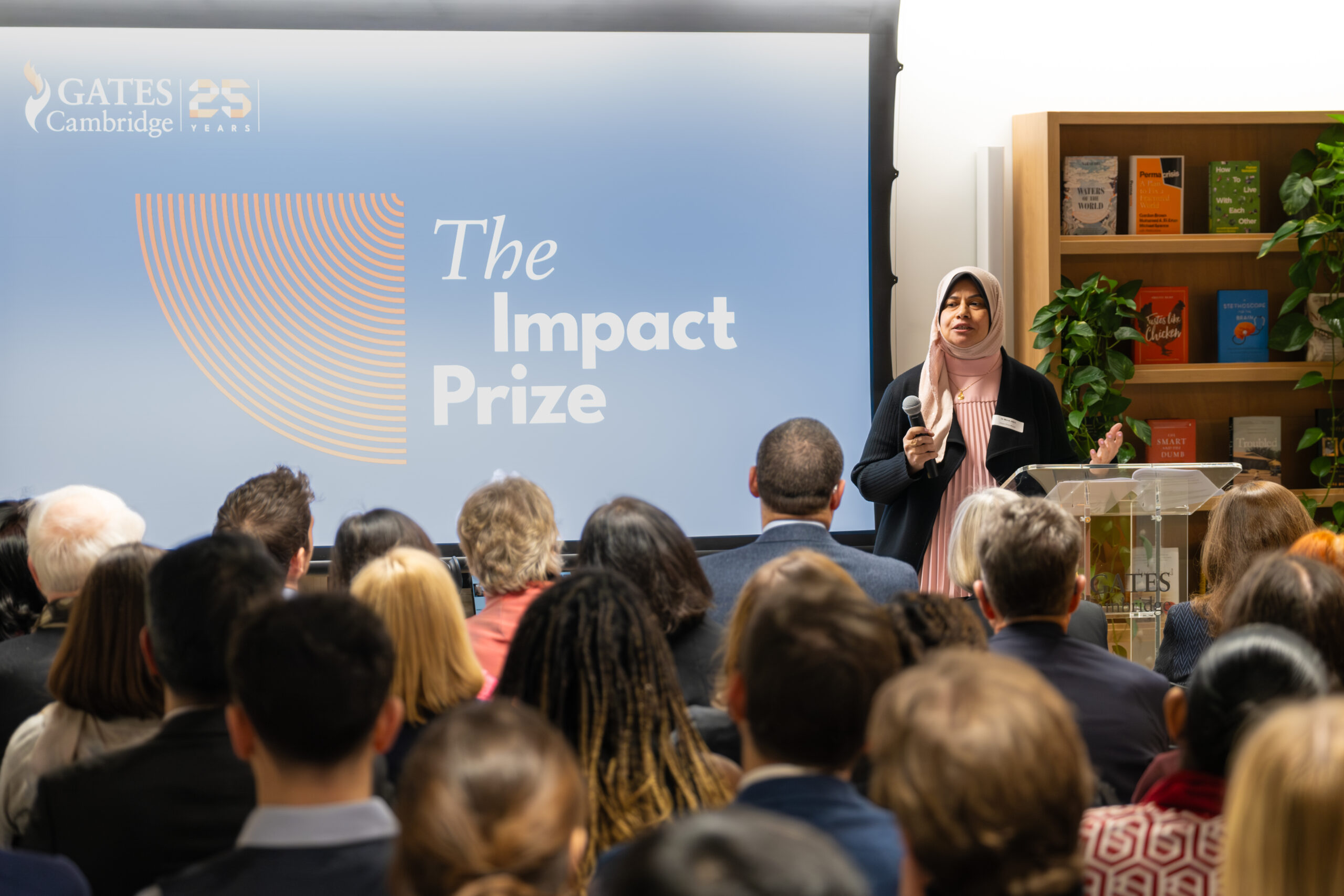
Impact Prize winner Mona Jebril speaks about her career in education and education research and how impact can take many forms.
I was the first Gates Cambridge Scholar from Gaza, but 12 years later I am still the only one. Scholarships play such an important role in times of conflict. I want others to have the opportunities I have had.
Mona Jebril
For Mona Jebril the commitment to a positive impact in the world – whatever form it takes – is something that drew her to Gates Cambridge.
She says: “I chose Gates Cambridge because of the focus on impact and social leadership within and beyond academia and because of the sense of community it offers. Working for real-world impact can be an isolated journey.”
The Gates Cambridge Impact Prize defines impact in the broadest sense and Mona’s work has always been about communicating her research within and beyond academia. To that end, she has experimented with all sorts of different genres, from animation to poetry. That has been risky because public engagement is still not fully encouraged within academia. She also faces risk as an academic from Gaza who writes about development in the region, for instance, in health and education. because the situation is so polarised. She says: “I sense that there is increasing silencing, censorship and avoidance of scholars from Palestine, particularly at this time because of Israel’s ongoing war on Gaza and the sensitivity of the Palestinian issue. My career feels constantly risky, but this prize makes me feel supported.”
PhD and beyond
Mona passed her PhD in Education without corrections in 2017. It looked at the multiple ways occupation and conflict in the Middle East have affected the mobility of academics in Gaza, their academic freedom and attempts to reform the higher education system. Before doing her viva, she had been working as a research assistant at Educational Reform and Innovation working on a collaborative project between the Faculty of Education project and the Council for At-Risk Academics on displaced Syrian academics in Turkey. The project mapped Syrian higher education pre and post 2011.
After her PhD, Mona, who did her master’s at Oxford, took a post as a research fellow for the Centre for Business Research [CBR] at Judge Business School. There she worked on a UK Research and Innovation-Global Challenge Research Fund project, R4HC-MENA involving the political economy of health in Gaza. It was a shift for Mona’s previous focus on education, but she enjoyed it. Similar to education, it was an under-researched area.
Mona stayed for three years and won the Gavin C. Reid Prize for the Best Paper by an CBR researcher for that work. It was at this time that she began to explore more creative ways of disseminating her knowledge. She says her interest dates back to her time doing her master’s at Oxford. She returned to Gaza and noted the gap between academic theories – in her case on dialogue between academics in Israel and Gaza – and a practical context full of complex challenges – one that has become ever more difficult in recent times. Mona believes Israeli universities and students need to urgently rebuild trust in order to make dialogue possible by holding their government to account, campaigning to stop the aggression against Gaza and working for the reconstruction of Gaza’s universities.
Public engagement
Another factor in Mona’s desire to reach a broader public with her research is the fact that she was aware that there are few policymakers in the region who make reference to academic publications. “It got me interested in different ways of creating impact to get my research out to wider audiences,” she says. She also drew on her experience as a student of English language and literature and a teacher with a keen awareness of the different learning styles of her students.
After her PhD Mona created four short films illustrating her research and when she did the health project she wanted to learn more skills so she started working on animations and created cartoons to illustrate her findings, supported by the Centre for Business Research. That snowballed and over the last years Mona has disseminated her research through poetry, theatre and now podcasts.
Some of her new skills were acquired through the University of Cambridge’s Creative Encounters programme; she learned to podcast through a Cambridge TV course; and for others she taught herself. She says: “Every year I turn into something else, be it a poet, a playwright or a podcaster. I quite enjoy this reinvention. Of course, I’m not an animator or filmmaker, but when I’m doing it I am. Now I am trying to integrate these skills in a more natural way.”
Mona also started to write articles for the education press and for think tanks such as the Carnegie Endowment and she took part in the Cambridge Festival of Ideas through which she became a member of the network of evidence and expertise in public policy at the Centre for Science and Policy. That role entails advising policymakers from the Middle East about her research. She also did a talk at a British sixth form college.
By writing for the press Mona is following in her father’s footsteps. He also contributed articles to the press alongside his work in education. He died while Mona was studying in the UK and could not return home due to the political situation. Mona, a former teacher and lecturer in Gaza, co-founded a scholarship for female students of English at Al Azhar University of Gaza in 2008 and ran it with her brothers until she started her PhD. The scholarship, funded by the Kolmar Group, was renamed the Abdel Aziz Salim Jibril Scholarship in honour of their father and in recognition of his passion for education and his strong values.
Mona says she had considered journalism before turning to teaching and has always had a burning desire to ask people questions and give them a voice. “Everyone has something to share,” she says. She has put that commitment into her latest endeavour, the podcast A Life Lived in Conflict, in which she interviews a broad span of people from conflict zones ranging from Gaza to Afghanistan and from entrepreneurs to students.
“My podcast tries to give a voice to people in conflict areas and from different disciplines. I am trying to bridge the gap between policymakers, academics and the public,” says Mona. Alongside the podcast episodes, she produces voicing and engagement cards which enable listeners to participate in the conversation and to continue the conversation. “I want to encourage more interaction and make the interviews more meaningful,” she says.
All of this is testament to Mona’s creative and entrepreneurial spirit and indeed she has also dabbled in business, taking part in a business incubation session while a PhD student to support her plan to set up a remote working agency in Gaza.
Other work
Other research projects Mona has taken part in over the years include a Knowledge Exchange programme on Lebanon and the Faculty of Education’s Close the gap project, which aimed to ‘disrupt’ existing postgraduate selection processes and test alternative methods to enable more students from minority ethnic backgrounds to do postgraduate studies. For the latter Mona did over 50 interviews with students, academics and administrative staff at Cambridge about the admissions process. She found that each department had a different way of doing admissions, which provoked deep thinking on how the process could be improved and challenges overcome.
In addition, Mona volunteered as an expert advisor to the Dominique Simpson Memorial Trust, a UK charity which supported the education of disadvantaged young people in the Occupied Palestinian Territories from 2005- 2021, with a particular focus on the education of girls and young women.
Currently, Mona is a Bye-Fellow of Education and Academic Development at Queen’s College as well as remaining a research associate with the Centre for Business Research. Since the outbreak of the current war in Gaza, Mona has been working on articles relating to her PhD and to the role of global universities in rebuilding after conflict. She also has a book chapter in process on academic mobility and an article on the reconstruction of Gaza’s universities. In addition, she is taking up offers to speak to the media and is currently applying for research and teaching jobs.
Impact
Mona says she is delighted that she has won the Gates Cambridge Impact Prize, particularly since she was notified the day before her mother’s birthday and the award ceremony took place on her father’s birthday. She says: “I find this symbolic, in a sense that it is an opportunity for me to feel their support at this time, despite the distance, but also because it feels as if it is an acknowledgement of the impact they had on me.”
She adds: “I really want my work to have an impact. I want to give something back and that means ensuring that my knowledge is accessible to everyone. That engagement with the public is not generally encouraged in academia. It can make you feel like you are an outsider and that you are doing something wrong. So to have won the Impact Prize sends the message that there are different forms of impact that are valid and different ways of going about creating impact.
“My background is as a teacher and lecturer. It can be hard to measure the impact you have. It’s not measured in titles or numbers. I recall one student who was not communicating or doing well in any subject. But it turned out after a year that she had absorbed everything I taught and she was speaking English. I think this prize means that you do not have to follow a set path to have impact.”
She would like to build on that impact and to encourage other academics from Gaza to come to the UK. She says: “I was the first Gates Cambridge Scholar from Gaza, but 12 years later I am still the only one. Scholarships play such an important role in times of conflict. I want others to have the opportunities I have had. There are so many brilliant students in Gaza. I hope I can help to encourage universities to reach out to others.”












